International HRM Report: Analysis of an Expatriate Interview
VerifiedAdded on 2022/09/07
|18
|4368
|21
Report
AI Summary
This report analyzes an interview with an expatriate working for Singtel in Singapore, focusing on international human resource management (IHRM) principles. The study identifies and evaluates three key IHRM issues: language barriers, cultural adaptation, and expatriation costs. The report delves into cultural challenges, career issues, and the impact on dual-career couples, providing insights into the expatriate's experiences. The analysis highlights the importance of addressing cultural differences, career development, and family considerations. The report concludes with recommendations for organizations to mitigate these challenges and support expatriates effectively. The report also explores the challenges faced by the expatriate including language barriers, cultural differences, and the financial implications of expatriation, offering insights into the complexities of international assignments.
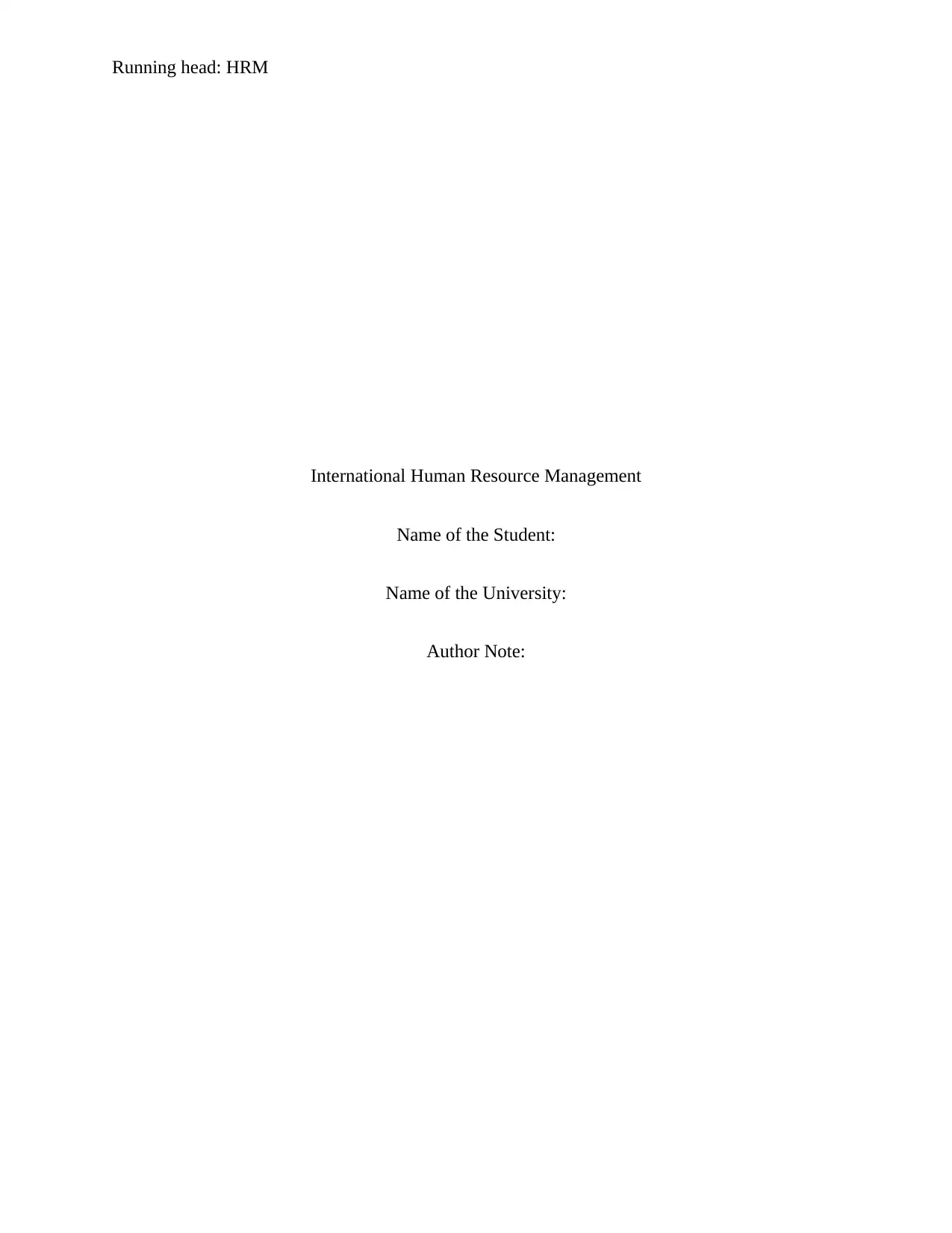
Running head: HRM
International Human Resource Management
Name of the Student:
Name of the University:
Author Note:
International Human Resource Management
Name of the Student:
Name of the University:
Author Note:
Paraphrase This Document
Need a fresh take? Get an instant paraphrase of this document with our AI Paraphraser
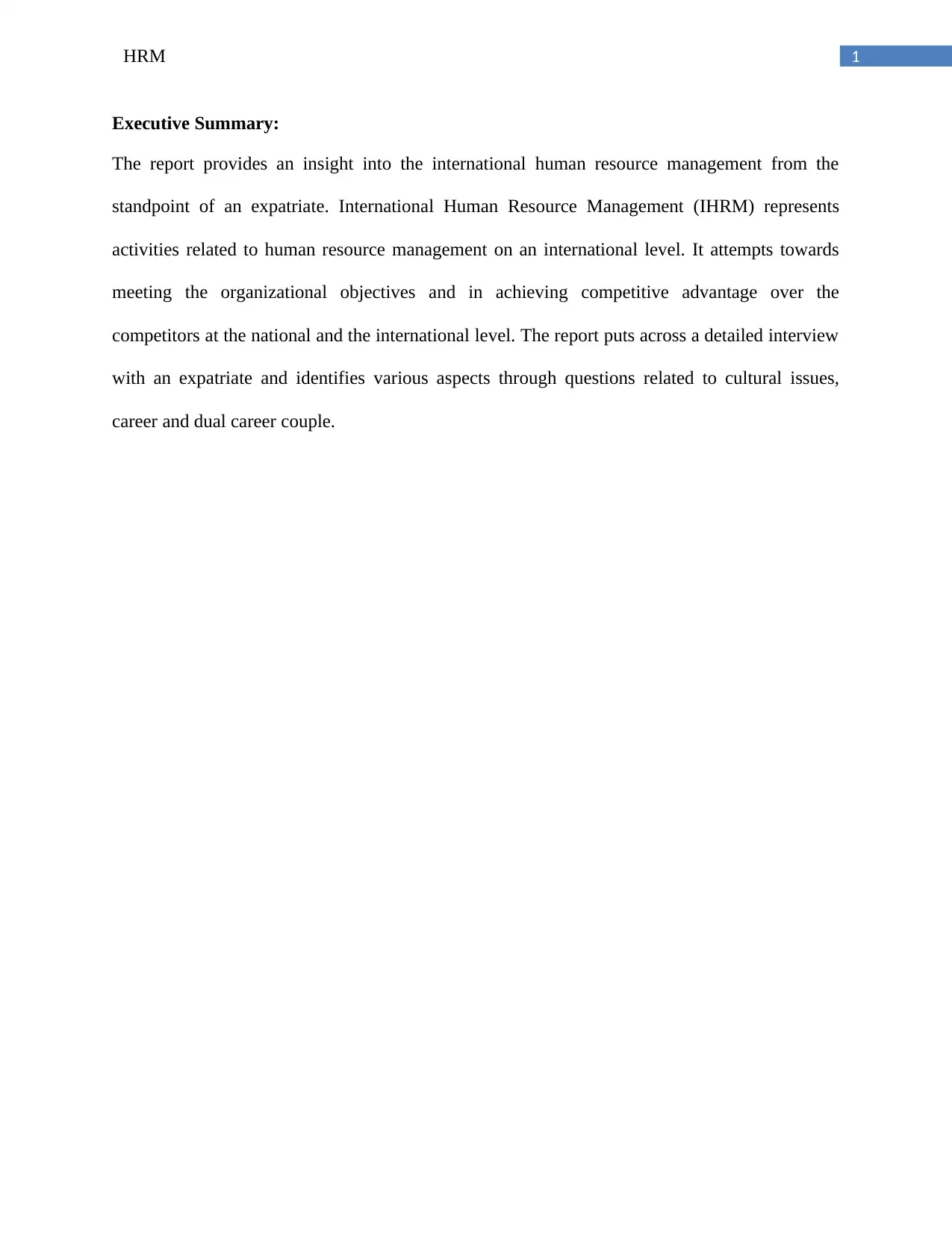
1HRM
Executive Summary:
The report provides an insight into the international human resource management from the
standpoint of an expatriate. International Human Resource Management (IHRM) represents
activities related to human resource management on an international level. It attempts towards
meeting the organizational objectives and in achieving competitive advantage over the
competitors at the national and the international level. The report puts across a detailed interview
with an expatriate and identifies various aspects through questions related to cultural issues,
career and dual career couple.
Executive Summary:
The report provides an insight into the international human resource management from the
standpoint of an expatriate. International Human Resource Management (IHRM) represents
activities related to human resource management on an international level. It attempts towards
meeting the organizational objectives and in achieving competitive advantage over the
competitors at the national and the international level. The report puts across a detailed interview
with an expatriate and identifies various aspects through questions related to cultural issues,
career and dual career couple.
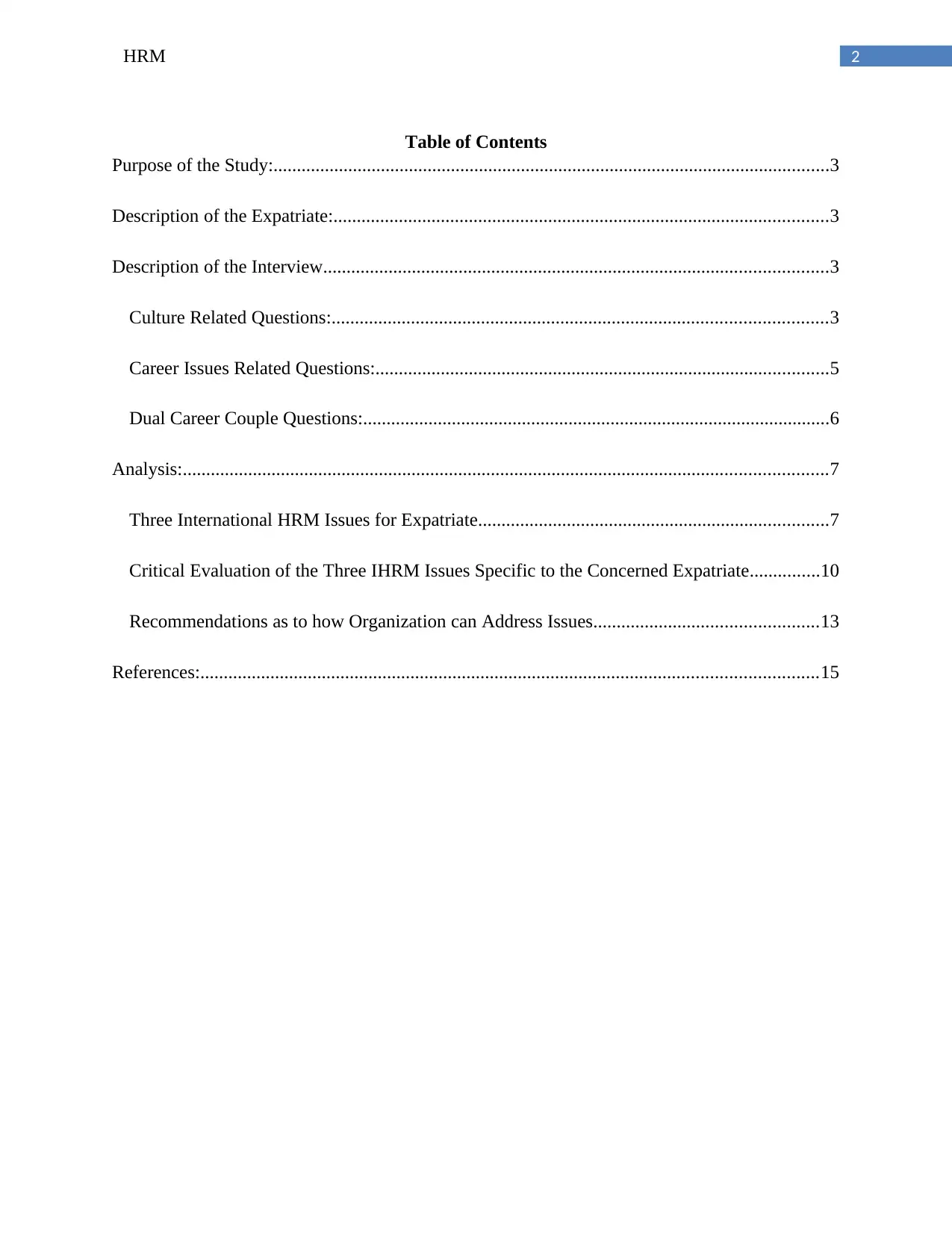
2HRM
Table of Contents
Purpose of the Study:.......................................................................................................................3
Description of the Expatriate:..........................................................................................................3
Description of the Interview............................................................................................................3
Culture Related Questions:..........................................................................................................3
Career Issues Related Questions:.................................................................................................5
Dual Career Couple Questions:....................................................................................................6
Analysis:..........................................................................................................................................7
Three International HRM Issues for Expatriate...........................................................................7
Critical Evaluation of the Three IHRM Issues Specific to the Concerned Expatriate...............10
Recommendations as to how Organization can Address Issues................................................13
References:....................................................................................................................................15
Table of Contents
Purpose of the Study:.......................................................................................................................3
Description of the Expatriate:..........................................................................................................3
Description of the Interview............................................................................................................3
Culture Related Questions:..........................................................................................................3
Career Issues Related Questions:.................................................................................................5
Dual Career Couple Questions:....................................................................................................6
Analysis:..........................................................................................................................................7
Three International HRM Issues for Expatriate...........................................................................7
Critical Evaluation of the Three IHRM Issues Specific to the Concerned Expatriate...............10
Recommendations as to how Organization can Address Issues................................................13
References:....................................................................................................................................15
⊘ This is a preview!⊘
Do you want full access?
Subscribe today to unlock all pages.

Trusted by 1+ million students worldwide
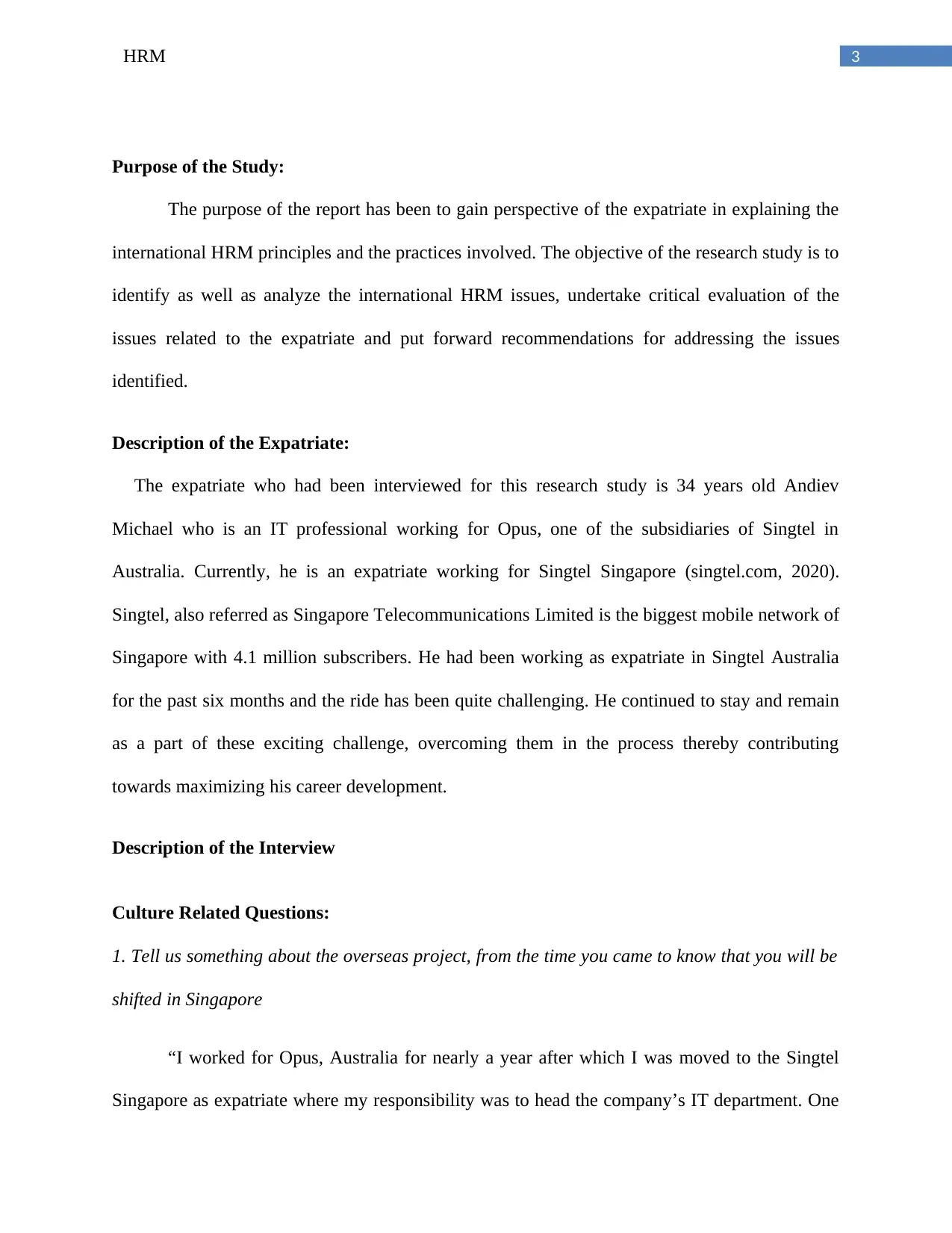
3HRM
Purpose of the Study:
The purpose of the report has been to gain perspective of the expatriate in explaining the
international HRM principles and the practices involved. The objective of the research study is to
identify as well as analyze the international HRM issues, undertake critical evaluation of the
issues related to the expatriate and put forward recommendations for addressing the issues
identified.
Description of the Expatriate:
The expatriate who had been interviewed for this research study is 34 years old Andiev
Michael who is an IT professional working for Opus, one of the subsidiaries of Singtel in
Australia. Currently, he is an expatriate working for Singtel Singapore (singtel.com, 2020).
Singtel, also referred as Singapore Telecommunications Limited is the biggest mobile network of
Singapore with 4.1 million subscribers. He had been working as expatriate in Singtel Australia
for the past six months and the ride has been quite challenging. He continued to stay and remain
as a part of these exciting challenge, overcoming them in the process thereby contributing
towards maximizing his career development.
Description of the Interview
Culture Related Questions:
1. Tell us something about the overseas project, from the time you came to know that you will be
shifted in Singapore
“I worked for Opus, Australia for nearly a year after which I was moved to the Singtel
Singapore as expatriate where my responsibility was to head the company’s IT department. One
Purpose of the Study:
The purpose of the report has been to gain perspective of the expatriate in explaining the
international HRM principles and the practices involved. The objective of the research study is to
identify as well as analyze the international HRM issues, undertake critical evaluation of the
issues related to the expatriate and put forward recommendations for addressing the issues
identified.
Description of the Expatriate:
The expatriate who had been interviewed for this research study is 34 years old Andiev
Michael who is an IT professional working for Opus, one of the subsidiaries of Singtel in
Australia. Currently, he is an expatriate working for Singtel Singapore (singtel.com, 2020).
Singtel, also referred as Singapore Telecommunications Limited is the biggest mobile network of
Singapore with 4.1 million subscribers. He had been working as expatriate in Singtel Australia
for the past six months and the ride has been quite challenging. He continued to stay and remain
as a part of these exciting challenge, overcoming them in the process thereby contributing
towards maximizing his career development.
Description of the Interview
Culture Related Questions:
1. Tell us something about the overseas project, from the time you came to know that you will be
shifted in Singapore
“I worked for Opus, Australia for nearly a year after which I was moved to the Singtel
Singapore as expatriate where my responsibility was to head the company’s IT department. One
Paraphrase This Document
Need a fresh take? Get an instant paraphrase of this document with our AI Paraphraser
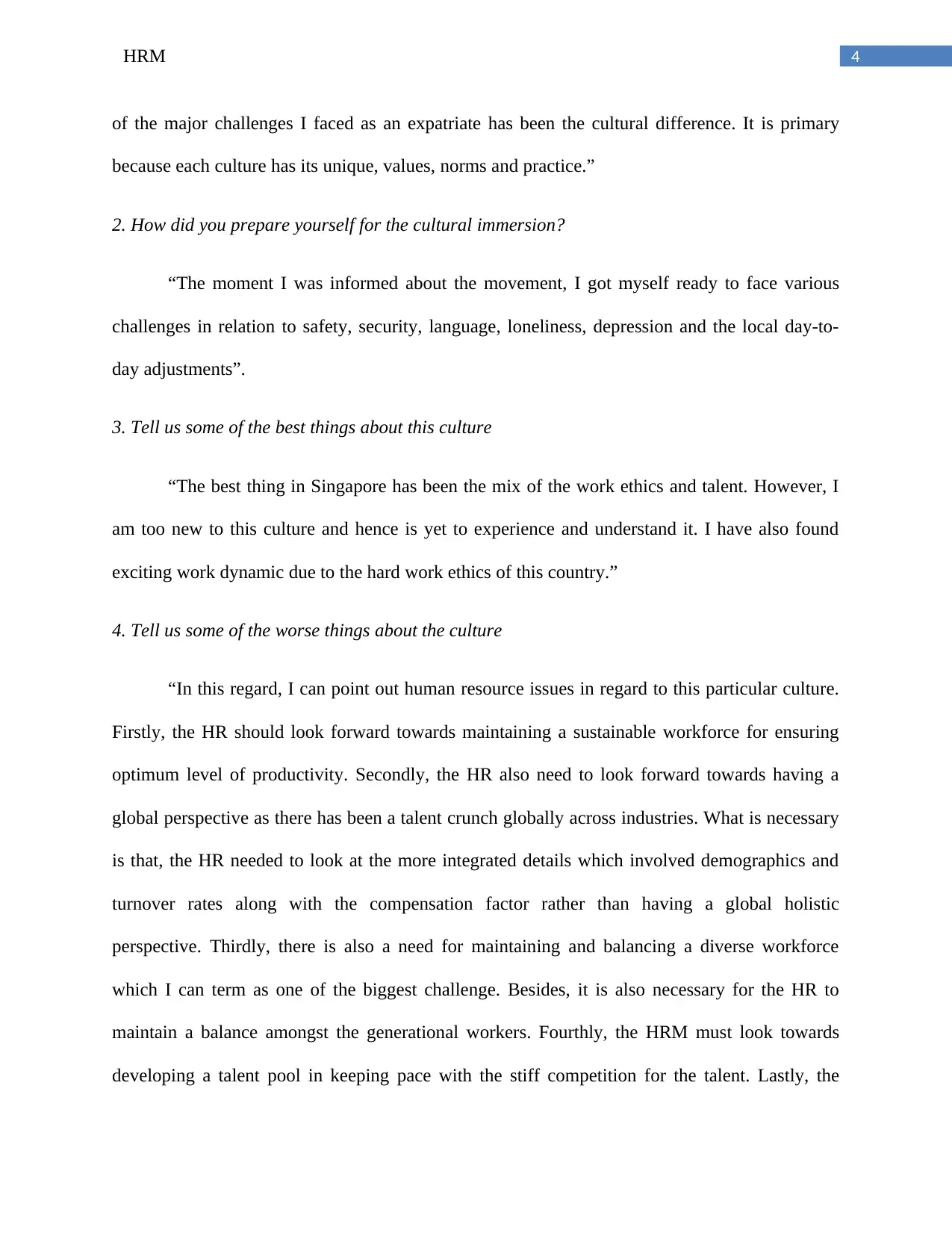
4HRM
of the major challenges I faced as an expatriate has been the cultural difference. It is primary
because each culture has its unique, values, norms and practice.”
2. How did you prepare yourself for the cultural immersion?
“The moment I was informed about the movement, I got myself ready to face various
challenges in relation to safety, security, language, loneliness, depression and the local day-to-
day adjustments”.
3. Tell us some of the best things about this culture
“The best thing in Singapore has been the mix of the work ethics and talent. However, I
am too new to this culture and hence is yet to experience and understand it. I have also found
exciting work dynamic due to the hard work ethics of this country.”
4. Tell us some of the worse things about the culture
“In this regard, I can point out human resource issues in regard to this particular culture.
Firstly, the HR should look forward towards maintaining a sustainable workforce for ensuring
optimum level of productivity. Secondly, the HR also need to look forward towards having a
global perspective as there has been a talent crunch globally across industries. What is necessary
is that, the HR needed to look at the more integrated details which involved demographics and
turnover rates along with the compensation factor rather than having a global holistic
perspective. Thirdly, there is also a need for maintaining and balancing a diverse workforce
which I can term as one of the biggest challenge. Besides, it is also necessary for the HR to
maintain a balance amongst the generational workers. Fourthly, the HRM must look towards
developing a talent pool in keeping pace with the stiff competition for the talent. Lastly, the
of the major challenges I faced as an expatriate has been the cultural difference. It is primary
because each culture has its unique, values, norms and practice.”
2. How did you prepare yourself for the cultural immersion?
“The moment I was informed about the movement, I got myself ready to face various
challenges in relation to safety, security, language, loneliness, depression and the local day-to-
day adjustments”.
3. Tell us some of the best things about this culture
“The best thing in Singapore has been the mix of the work ethics and talent. However, I
am too new to this culture and hence is yet to experience and understand it. I have also found
exciting work dynamic due to the hard work ethics of this country.”
4. Tell us some of the worse things about the culture
“In this regard, I can point out human resource issues in regard to this particular culture.
Firstly, the HR should look forward towards maintaining a sustainable workforce for ensuring
optimum level of productivity. Secondly, the HR also need to look forward towards having a
global perspective as there has been a talent crunch globally across industries. What is necessary
is that, the HR needed to look at the more integrated details which involved demographics and
turnover rates along with the compensation factor rather than having a global holistic
perspective. Thirdly, there is also a need for maintaining and balancing a diverse workforce
which I can term as one of the biggest challenge. Besides, it is also necessary for the HR to
maintain a balance amongst the generational workers. Fourthly, the HRM must look towards
developing a talent pool in keeping pace with the stiff competition for the talent. Lastly, the
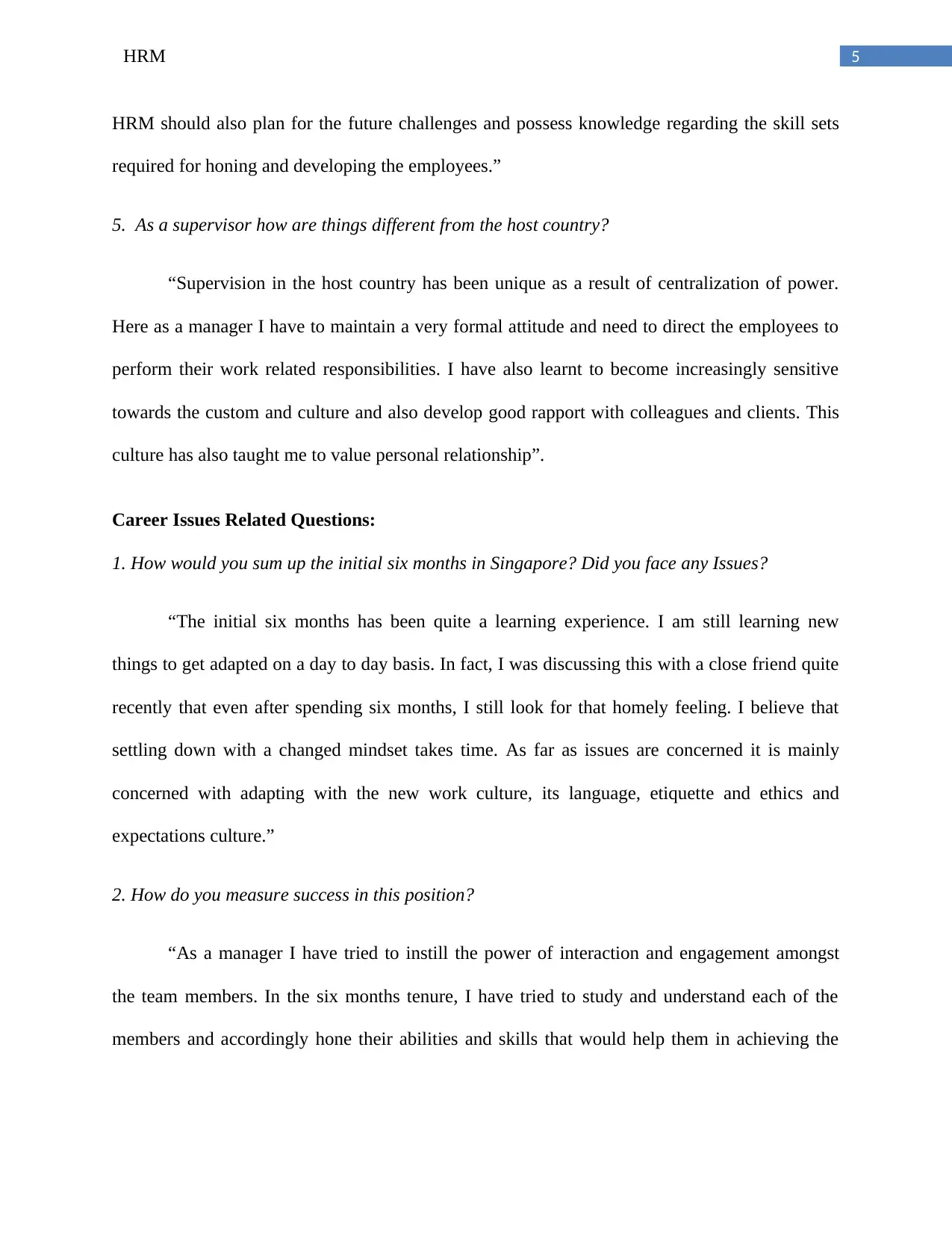
5HRM
HRM should also plan for the future challenges and possess knowledge regarding the skill sets
required for honing and developing the employees.”
5. As a supervisor how are things different from the host country?
“Supervision in the host country has been unique as a result of centralization of power.
Here as a manager I have to maintain a very formal attitude and need to direct the employees to
perform their work related responsibilities. I have also learnt to become increasingly sensitive
towards the custom and culture and also develop good rapport with colleagues and clients. This
culture has also taught me to value personal relationship”.
Career Issues Related Questions:
1. How would you sum up the initial six months in Singapore? Did you face any Issues?
“The initial six months has been quite a learning experience. I am still learning new
things to get adapted on a day to day basis. In fact, I was discussing this with a close friend quite
recently that even after spending six months, I still look for that homely feeling. I believe that
settling down with a changed mindset takes time. As far as issues are concerned it is mainly
concerned with adapting with the new work culture, its language, etiquette and ethics and
expectations culture.”
2. How do you measure success in this position?
“As a manager I have tried to instill the power of interaction and engagement amongst
the team members. In the six months tenure, I have tried to study and understand each of the
members and accordingly hone their abilities and skills that would help them in achieving the
HRM should also plan for the future challenges and possess knowledge regarding the skill sets
required for honing and developing the employees.”
5. As a supervisor how are things different from the host country?
“Supervision in the host country has been unique as a result of centralization of power.
Here as a manager I have to maintain a very formal attitude and need to direct the employees to
perform their work related responsibilities. I have also learnt to become increasingly sensitive
towards the custom and culture and also develop good rapport with colleagues and clients. This
culture has also taught me to value personal relationship”.
Career Issues Related Questions:
1. How would you sum up the initial six months in Singapore? Did you face any Issues?
“The initial six months has been quite a learning experience. I am still learning new
things to get adapted on a day to day basis. In fact, I was discussing this with a close friend quite
recently that even after spending six months, I still look for that homely feeling. I believe that
settling down with a changed mindset takes time. As far as issues are concerned it is mainly
concerned with adapting with the new work culture, its language, etiquette and ethics and
expectations culture.”
2. How do you measure success in this position?
“As a manager I have tried to instill the power of interaction and engagement amongst
the team members. In the six months tenure, I have tried to study and understand each of the
members and accordingly hone their abilities and skills that would help them in achieving the
⊘ This is a preview!⊘
Do you want full access?
Subscribe today to unlock all pages.

Trusted by 1+ million students worldwide
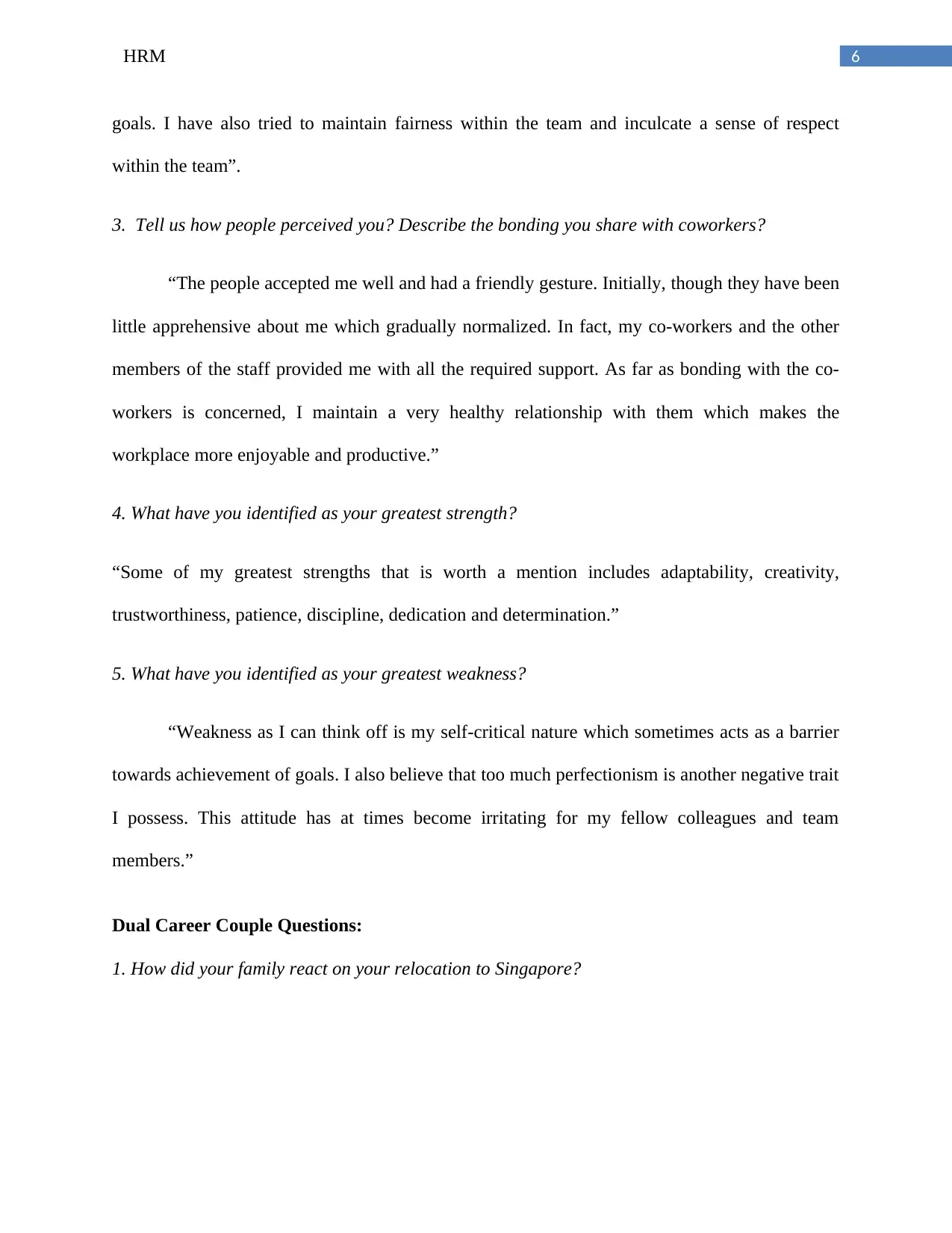
6HRM
goals. I have also tried to maintain fairness within the team and inculcate a sense of respect
within the team”.
3. Tell us how people perceived you? Describe the bonding you share with coworkers?
“The people accepted me well and had a friendly gesture. Initially, though they have been
little apprehensive about me which gradually normalized. In fact, my co-workers and the other
members of the staff provided me with all the required support. As far as bonding with the co-
workers is concerned, I maintain a very healthy relationship with them which makes the
workplace more enjoyable and productive.”
4. What have you identified as your greatest strength?
“Some of my greatest strengths that is worth a mention includes adaptability, creativity,
trustworthiness, patience, discipline, dedication and determination.”
5. What have you identified as your greatest weakness?
“Weakness as I can think off is my self-critical nature which sometimes acts as a barrier
towards achievement of goals. I also believe that too much perfectionism is another negative trait
I possess. This attitude has at times become irritating for my fellow colleagues and team
members.”
Dual Career Couple Questions:
1. How did your family react on your relocation to Singapore?
goals. I have also tried to maintain fairness within the team and inculcate a sense of respect
within the team”.
3. Tell us how people perceived you? Describe the bonding you share with coworkers?
“The people accepted me well and had a friendly gesture. Initially, though they have been
little apprehensive about me which gradually normalized. In fact, my co-workers and the other
members of the staff provided me with all the required support. As far as bonding with the co-
workers is concerned, I maintain a very healthy relationship with them which makes the
workplace more enjoyable and productive.”
4. What have you identified as your greatest strength?
“Some of my greatest strengths that is worth a mention includes adaptability, creativity,
trustworthiness, patience, discipline, dedication and determination.”
5. What have you identified as your greatest weakness?
“Weakness as I can think off is my self-critical nature which sometimes acts as a barrier
towards achievement of goals. I also believe that too much perfectionism is another negative trait
I possess. This attitude has at times become irritating for my fellow colleagues and team
members.”
Dual Career Couple Questions:
1. How did your family react on your relocation to Singapore?
Paraphrase This Document
Need a fresh take? Get an instant paraphrase of this document with our AI Paraphraser
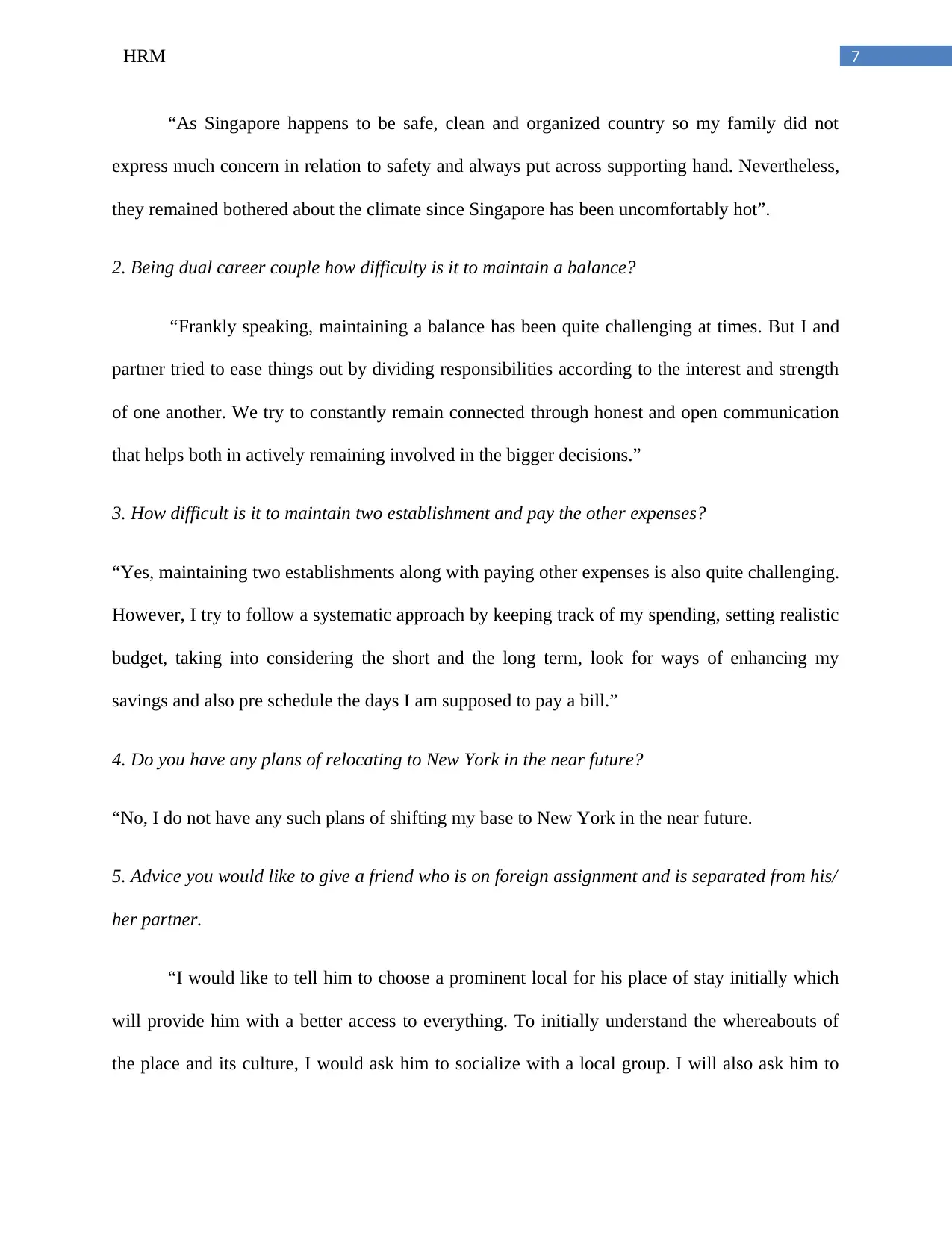
7HRM
“As Singapore happens to be safe, clean and organized country so my family did not
express much concern in relation to safety and always put across supporting hand. Nevertheless,
they remained bothered about the climate since Singapore has been uncomfortably hot”.
2. Being dual career couple how difficulty is it to maintain a balance?
“Frankly speaking, maintaining a balance has been quite challenging at times. But I and
partner tried to ease things out by dividing responsibilities according to the interest and strength
of one another. We try to constantly remain connected through honest and open communication
that helps both in actively remaining involved in the bigger decisions.”
3. How difficult is it to maintain two establishment and pay the other expenses?
“Yes, maintaining two establishments along with paying other expenses is also quite challenging.
However, I try to follow a systematic approach by keeping track of my spending, setting realistic
budget, taking into considering the short and the long term, look for ways of enhancing my
savings and also pre schedule the days I am supposed to pay a bill.”
4. Do you have any plans of relocating to New York in the near future?
“No, I do not have any such plans of shifting my base to New York in the near future.
5. Advice you would like to give a friend who is on foreign assignment and is separated from his/
her partner.
“I would like to tell him to choose a prominent local for his place of stay initially which
will provide him with a better access to everything. To initially understand the whereabouts of
the place and its culture, I would ask him to socialize with a local group. I will also ask him to
“As Singapore happens to be safe, clean and organized country so my family did not
express much concern in relation to safety and always put across supporting hand. Nevertheless,
they remained bothered about the climate since Singapore has been uncomfortably hot”.
2. Being dual career couple how difficulty is it to maintain a balance?
“Frankly speaking, maintaining a balance has been quite challenging at times. But I and
partner tried to ease things out by dividing responsibilities according to the interest and strength
of one another. We try to constantly remain connected through honest and open communication
that helps both in actively remaining involved in the bigger decisions.”
3. How difficult is it to maintain two establishment and pay the other expenses?
“Yes, maintaining two establishments along with paying other expenses is also quite challenging.
However, I try to follow a systematic approach by keeping track of my spending, setting realistic
budget, taking into considering the short and the long term, look for ways of enhancing my
savings and also pre schedule the days I am supposed to pay a bill.”
4. Do you have any plans of relocating to New York in the near future?
“No, I do not have any such plans of shifting my base to New York in the near future.
5. Advice you would like to give a friend who is on foreign assignment and is separated from his/
her partner.
“I would like to tell him to choose a prominent local for his place of stay initially which
will provide him with a better access to everything. To initially understand the whereabouts of
the place and its culture, I would ask him to socialize with a local group. I will also ask him to
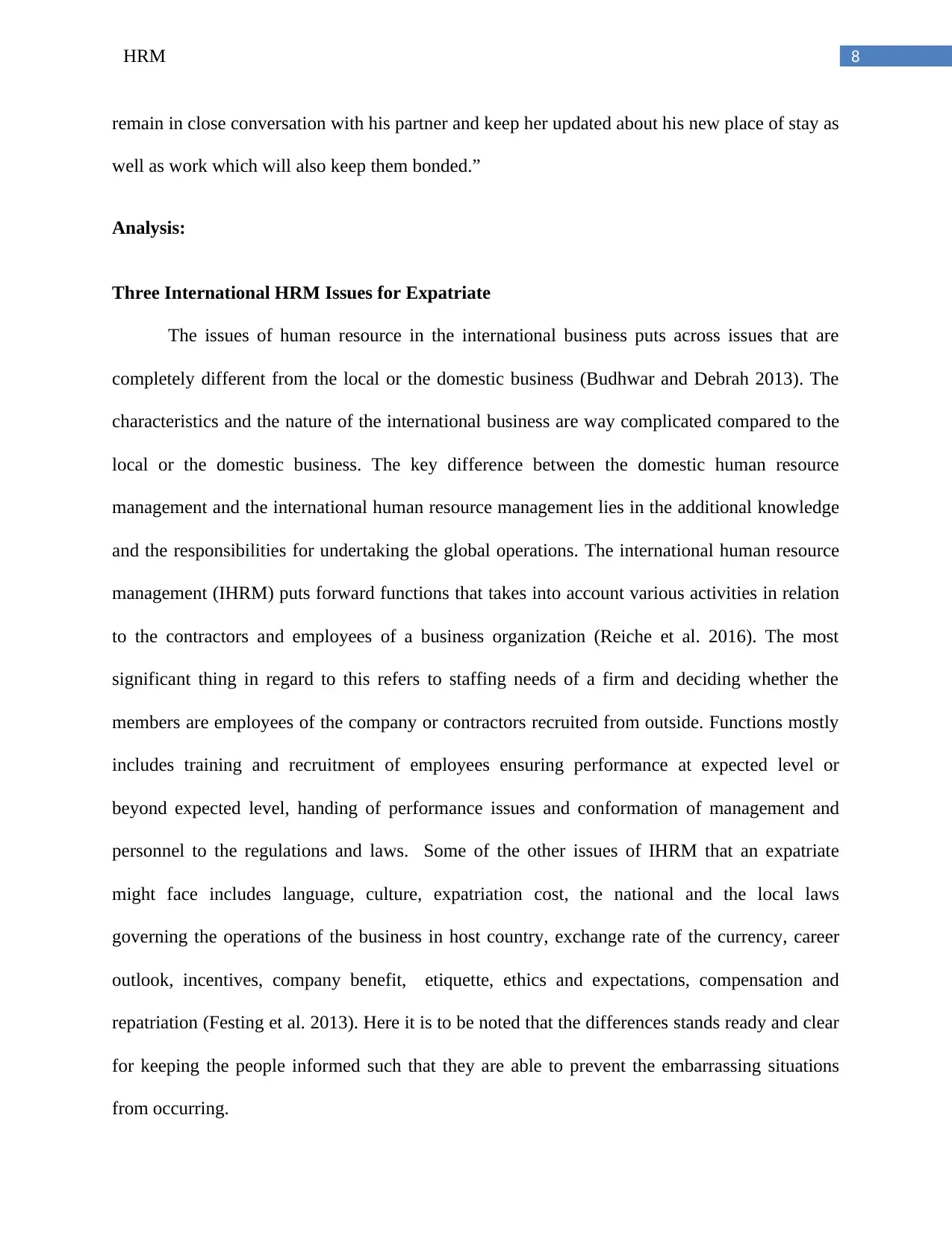
8HRM
remain in close conversation with his partner and keep her updated about his new place of stay as
well as work which will also keep them bonded.”
Analysis:
Three International HRM Issues for Expatriate
The issues of human resource in the international business puts across issues that are
completely different from the local or the domestic business (Budhwar and Debrah 2013). The
characteristics and the nature of the international business are way complicated compared to the
local or the domestic business. The key difference between the domestic human resource
management and the international human resource management lies in the additional knowledge
and the responsibilities for undertaking the global operations. The international human resource
management (IHRM) puts forward functions that takes into account various activities in relation
to the contractors and employees of a business organization (Reiche et al. 2016). The most
significant thing in regard to this refers to staffing needs of a firm and deciding whether the
members are employees of the company or contractors recruited from outside. Functions mostly
includes training and recruitment of employees ensuring performance at expected level or
beyond expected level, handing of performance issues and conformation of management and
personnel to the regulations and laws. Some of the other issues of IHRM that an expatriate
might face includes language, culture, expatriation cost, the national and the local laws
governing the operations of the business in host country, exchange rate of the currency, career
outlook, incentives, company benefit, etiquette, ethics and expectations, compensation and
repatriation (Festing et al. 2013). Here it is to be noted that the differences stands ready and clear
for keeping the people informed such that they are able to prevent the embarrassing situations
from occurring.
remain in close conversation with his partner and keep her updated about his new place of stay as
well as work which will also keep them bonded.”
Analysis:
Three International HRM Issues for Expatriate
The issues of human resource in the international business puts across issues that are
completely different from the local or the domestic business (Budhwar and Debrah 2013). The
characteristics and the nature of the international business are way complicated compared to the
local or the domestic business. The key difference between the domestic human resource
management and the international human resource management lies in the additional knowledge
and the responsibilities for undertaking the global operations. The international human resource
management (IHRM) puts forward functions that takes into account various activities in relation
to the contractors and employees of a business organization (Reiche et al. 2016). The most
significant thing in regard to this refers to staffing needs of a firm and deciding whether the
members are employees of the company or contractors recruited from outside. Functions mostly
includes training and recruitment of employees ensuring performance at expected level or
beyond expected level, handing of performance issues and conformation of management and
personnel to the regulations and laws. Some of the other issues of IHRM that an expatriate
might face includes language, culture, expatriation cost, the national and the local laws
governing the operations of the business in host country, exchange rate of the currency, career
outlook, incentives, company benefit, etiquette, ethics and expectations, compensation and
repatriation (Festing et al. 2013). Here it is to be noted that the differences stands ready and clear
for keeping the people informed such that they are able to prevent the embarrassing situations
from occurring.
⊘ This is a preview!⊘
Do you want full access?
Subscribe today to unlock all pages.

Trusted by 1+ million students worldwide
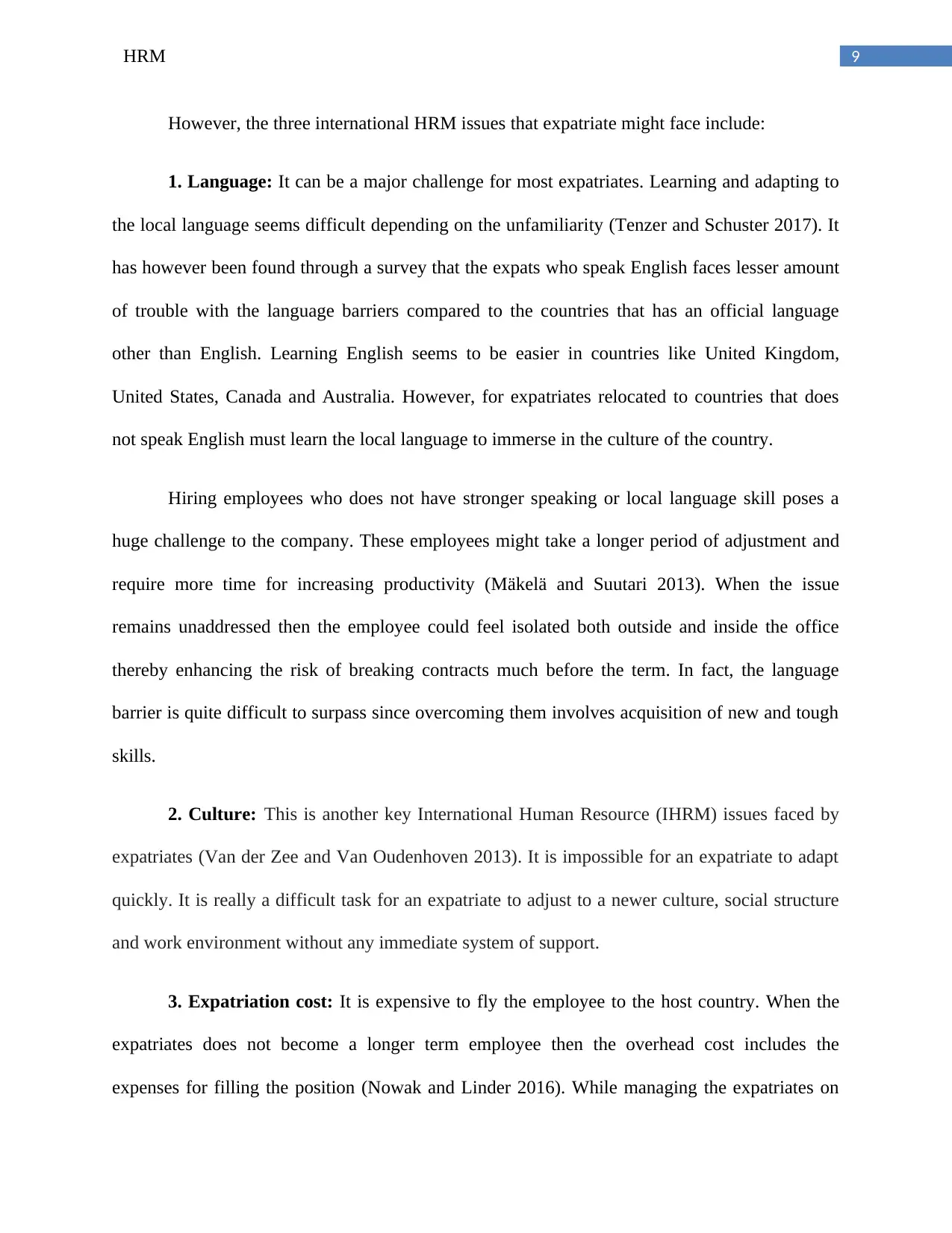
9HRM
However, the three international HRM issues that expatriate might face include:
1. Language: It can be a major challenge for most expatriates. Learning and adapting to
the local language seems difficult depending on the unfamiliarity (Tenzer and Schuster 2017). It
has however been found through a survey that the expats who speak English faces lesser amount
of trouble with the language barriers compared to the countries that has an official language
other than English. Learning English seems to be easier in countries like United Kingdom,
United States, Canada and Australia. However, for expatriates relocated to countries that does
not speak English must learn the local language to immerse in the culture of the country.
Hiring employees who does not have stronger speaking or local language skill poses a
huge challenge to the company. These employees might take a longer period of adjustment and
require more time for increasing productivity (Mäkelä and Suutari 2013). When the issue
remains unaddressed then the employee could feel isolated both outside and inside the office
thereby enhancing the risk of breaking contracts much before the term. In fact, the language
barrier is quite difficult to surpass since overcoming them involves acquisition of new and tough
skills.
2. Culture: This is another key International Human Resource (IHRM) issues faced by
expatriates (Van der Zee and Van Oudenhoven 2013). It is impossible for an expatriate to adapt
quickly. It is really a difficult task for an expatriate to adjust to a newer culture, social structure
and work environment without any immediate system of support.
3. Expatriation cost: It is expensive to fly the employee to the host country. When the
expatriates does not become a longer term employee then the overhead cost includes the
expenses for filling the position (Nowak and Linder 2016). While managing the expatriates on
However, the three international HRM issues that expatriate might face include:
1. Language: It can be a major challenge for most expatriates. Learning and adapting to
the local language seems difficult depending on the unfamiliarity (Tenzer and Schuster 2017). It
has however been found through a survey that the expats who speak English faces lesser amount
of trouble with the language barriers compared to the countries that has an official language
other than English. Learning English seems to be easier in countries like United Kingdom,
United States, Canada and Australia. However, for expatriates relocated to countries that does
not speak English must learn the local language to immerse in the culture of the country.
Hiring employees who does not have stronger speaking or local language skill poses a
huge challenge to the company. These employees might take a longer period of adjustment and
require more time for increasing productivity (Mäkelä and Suutari 2013). When the issue
remains unaddressed then the employee could feel isolated both outside and inside the office
thereby enhancing the risk of breaking contracts much before the term. In fact, the language
barrier is quite difficult to surpass since overcoming them involves acquisition of new and tough
skills.
2. Culture: This is another key International Human Resource (IHRM) issues faced by
expatriates (Van der Zee and Van Oudenhoven 2013). It is impossible for an expatriate to adapt
quickly. It is really a difficult task for an expatriate to adjust to a newer culture, social structure
and work environment without any immediate system of support.
3. Expatriation cost: It is expensive to fly the employee to the host country. When the
expatriates does not become a longer term employee then the overhead cost includes the
expenses for filling the position (Nowak and Linder 2016). While managing the expatriates on
Paraphrase This Document
Need a fresh take? Get an instant paraphrase of this document with our AI Paraphraser
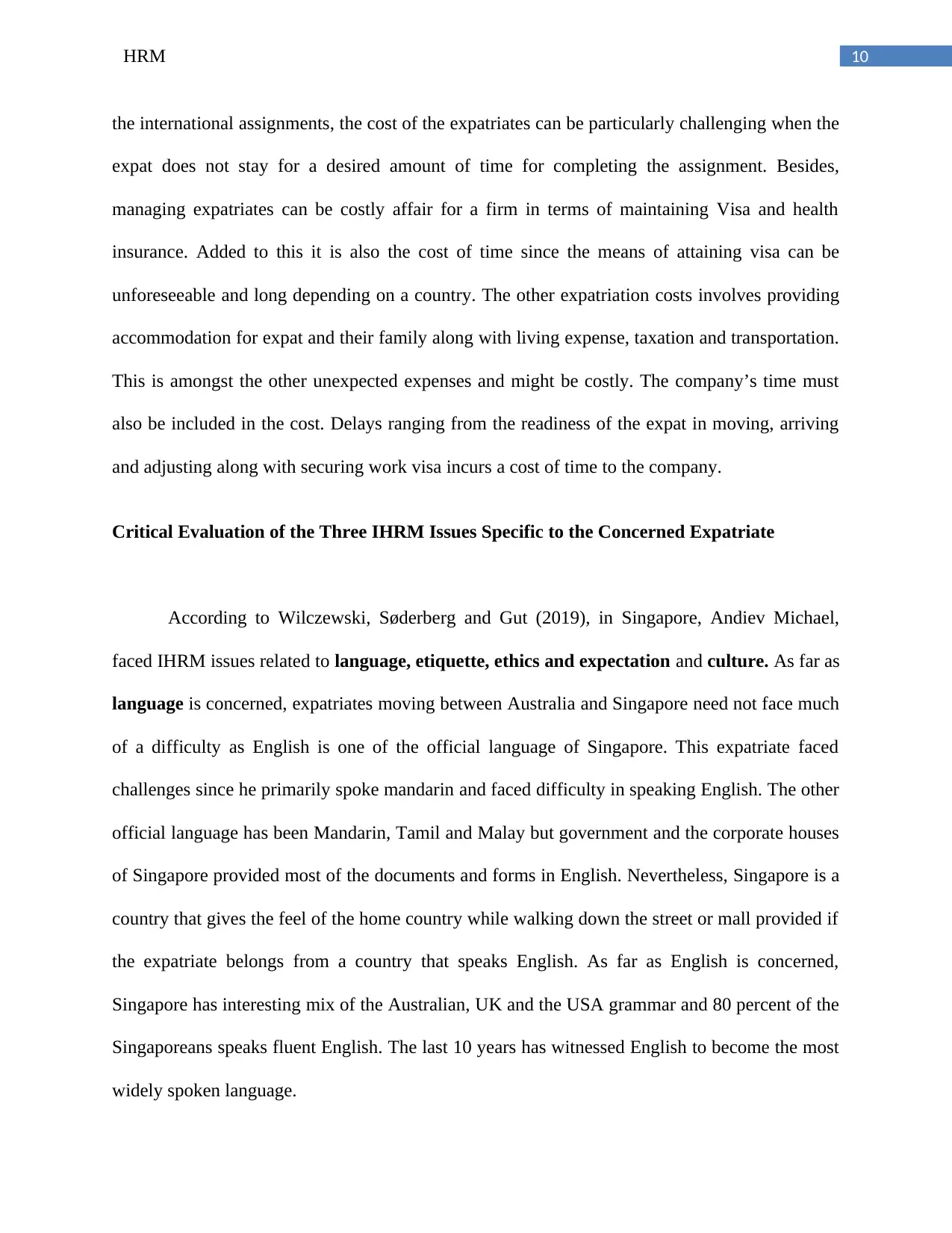
10HRM
the international assignments, the cost of the expatriates can be particularly challenging when the
expat does not stay for a desired amount of time for completing the assignment. Besides,
managing expatriates can be costly affair for a firm in terms of maintaining Visa and health
insurance. Added to this it is also the cost of time since the means of attaining visa can be
unforeseeable and long depending on a country. The other expatriation costs involves providing
accommodation for expat and their family along with living expense, taxation and transportation.
This is amongst the other unexpected expenses and might be costly. The company’s time must
also be included in the cost. Delays ranging from the readiness of the expat in moving, arriving
and adjusting along with securing work visa incurs a cost of time to the company.
Critical Evaluation of the Three IHRM Issues Specific to the Concerned Expatriate
According to Wilczewski, Søderberg and Gut (2019), in Singapore, Andiev Michael,
faced IHRM issues related to language, etiquette, ethics and expectation and culture. As far as
language is concerned, expatriates moving between Australia and Singapore need not face much
of a difficulty as English is one of the official language of Singapore. This expatriate faced
challenges since he primarily spoke mandarin and faced difficulty in speaking English. The other
official language has been Mandarin, Tamil and Malay but government and the corporate houses
of Singapore provided most of the documents and forms in English. Nevertheless, Singapore is a
country that gives the feel of the home country while walking down the street or mall provided if
the expatriate belongs from a country that speaks English. As far as English is concerned,
Singapore has interesting mix of the Australian, UK and the USA grammar and 80 percent of the
Singaporeans speaks fluent English. The last 10 years has witnessed English to become the most
widely spoken language.
the international assignments, the cost of the expatriates can be particularly challenging when the
expat does not stay for a desired amount of time for completing the assignment. Besides,
managing expatriates can be costly affair for a firm in terms of maintaining Visa and health
insurance. Added to this it is also the cost of time since the means of attaining visa can be
unforeseeable and long depending on a country. The other expatriation costs involves providing
accommodation for expat and their family along with living expense, taxation and transportation.
This is amongst the other unexpected expenses and might be costly. The company’s time must
also be included in the cost. Delays ranging from the readiness of the expat in moving, arriving
and adjusting along with securing work visa incurs a cost of time to the company.
Critical Evaluation of the Three IHRM Issues Specific to the Concerned Expatriate
According to Wilczewski, Søderberg and Gut (2019), in Singapore, Andiev Michael,
faced IHRM issues related to language, etiquette, ethics and expectation and culture. As far as
language is concerned, expatriates moving between Australia and Singapore need not face much
of a difficulty as English is one of the official language of Singapore. This expatriate faced
challenges since he primarily spoke mandarin and faced difficulty in speaking English. The other
official language has been Mandarin, Tamil and Malay but government and the corporate houses
of Singapore provided most of the documents and forms in English. Nevertheless, Singapore is a
country that gives the feel of the home country while walking down the street or mall provided if
the expatriate belongs from a country that speaks English. As far as English is concerned,
Singapore has interesting mix of the Australian, UK and the USA grammar and 80 percent of the
Singaporeans speaks fluent English. The last 10 years has witnessed English to become the most
widely spoken language.
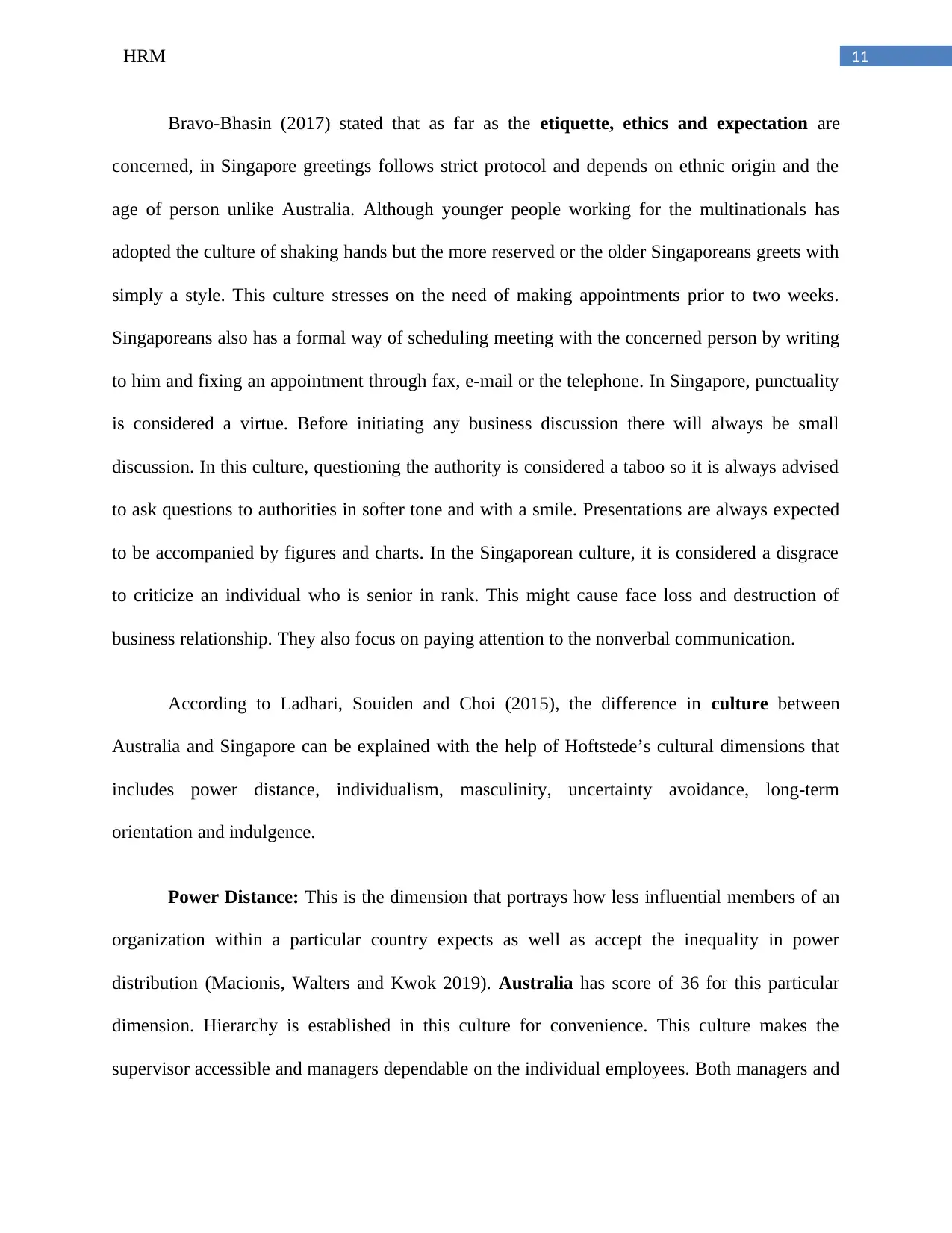
11HRM
Bravo-Bhasin (2017) stated that as far as the etiquette, ethics and expectation are
concerned, in Singapore greetings follows strict protocol and depends on ethnic origin and the
age of person unlike Australia. Although younger people working for the multinationals has
adopted the culture of shaking hands but the more reserved or the older Singaporeans greets with
simply a style. This culture stresses on the need of making appointments prior to two weeks.
Singaporeans also has a formal way of scheduling meeting with the concerned person by writing
to him and fixing an appointment through fax, e-mail or the telephone. In Singapore, punctuality
is considered a virtue. Before initiating any business discussion there will always be small
discussion. In this culture, questioning the authority is considered a taboo so it is always advised
to ask questions to authorities in softer tone and with a smile. Presentations are always expected
to be accompanied by figures and charts. In the Singaporean culture, it is considered a disgrace
to criticize an individual who is senior in rank. This might cause face loss and destruction of
business relationship. They also focus on paying attention to the nonverbal communication.
According to Ladhari, Souiden and Choi (2015), the difference in culture between
Australia and Singapore can be explained with the help of Hoftstede’s cultural dimensions that
includes power distance, individualism, masculinity, uncertainty avoidance, long-term
orientation and indulgence.
Power Distance: This is the dimension that portrays how less influential members of an
organization within a particular country expects as well as accept the inequality in power
distribution (Macionis, Walters and Kwok 2019). Australia has score of 36 for this particular
dimension. Hierarchy is established in this culture for convenience. This culture makes the
supervisor accessible and managers dependable on the individual employees. Both managers and
Bravo-Bhasin (2017) stated that as far as the etiquette, ethics and expectation are
concerned, in Singapore greetings follows strict protocol and depends on ethnic origin and the
age of person unlike Australia. Although younger people working for the multinationals has
adopted the culture of shaking hands but the more reserved or the older Singaporeans greets with
simply a style. This culture stresses on the need of making appointments prior to two weeks.
Singaporeans also has a formal way of scheduling meeting with the concerned person by writing
to him and fixing an appointment through fax, e-mail or the telephone. In Singapore, punctuality
is considered a virtue. Before initiating any business discussion there will always be small
discussion. In this culture, questioning the authority is considered a taboo so it is always advised
to ask questions to authorities in softer tone and with a smile. Presentations are always expected
to be accompanied by figures and charts. In the Singaporean culture, it is considered a disgrace
to criticize an individual who is senior in rank. This might cause face loss and destruction of
business relationship. They also focus on paying attention to the nonverbal communication.
According to Ladhari, Souiden and Choi (2015), the difference in culture between
Australia and Singapore can be explained with the help of Hoftstede’s cultural dimensions that
includes power distance, individualism, masculinity, uncertainty avoidance, long-term
orientation and indulgence.
Power Distance: This is the dimension that portrays how less influential members of an
organization within a particular country expects as well as accept the inequality in power
distribution (Macionis, Walters and Kwok 2019). Australia has score of 36 for this particular
dimension. Hierarchy is established in this culture for convenience. This culture makes the
supervisor accessible and managers dependable on the individual employees. Both managers and
⊘ This is a preview!⊘
Do you want full access?
Subscribe today to unlock all pages.

Trusted by 1+ million students worldwide
1 out of 18
Related Documents
Your All-in-One AI-Powered Toolkit for Academic Success.
+13062052269
info@desklib.com
Available 24*7 on WhatsApp / Email
![[object Object]](/_next/static/media/star-bottom.7253800d.svg)
Unlock your academic potential
Copyright © 2020–2026 A2Z Services. All Rights Reserved. Developed and managed by ZUCOL.




